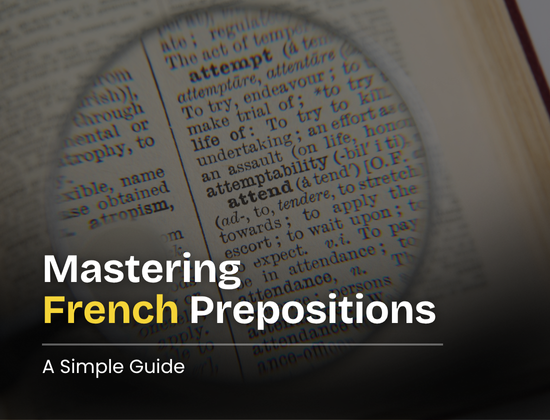
Mastering French Prepositions: A Simple Guide
.
Ever found yourself tangled in a web of “à,” “de,” and “en” while speaking French? You’re not alone. Prepositions are those sneaky little words that often carry more weight than they appear to. In English, we rarely think twice about them—“in the car,” “at the park,” “to the store.” But in French, using the wrong preposition can completely change the meaning of your sentence (or just make it sound plain wrong). Whether you're trying to say you're going to Paris or dreaming about cheese, mastering French prepositions is key to speaking fluently and confidently.
What Are French Prepositions?
Prepositions are words that show the relationship between a noun (or pronoun) and other elements in a sentence. They often describe location, direction, time, or introduce an object. In French, common prepositions include:
-
à – to, at, in
-
de – from, of, about
-
en – in, to (used with feminine countries or months)
-
dans – in (physically inside something)
-
chez – at the house of, with
-
sur – on
-
sous – under
-
avec – with
-
pour – for
-
par – through, by
Understanding how and when to use these can take your French from textbook to truly conversational.
The Big Two: “À” and “De”
These are arguably the most frequently used prepositions in French—and the most confusing!
“À” – Think Direction or Location
-
Je vais à l’école. (I’m going to school.)
-
Il est à la maison. (He is at home.)
“De” – Think Origin or Possession
-
Je viens de France. (I come from France.)
-
Le livre de Marie. (Marie’s book.)
Tip: Prepositions often contract with articles. For example:
-
à + le = au (Je vais au marché.)
-
de + les = des (Les amis des enfants.)
Prepositions of Place vs. Time
French prepositions also tell us when and where things happen.
Place
-
Le chat est sur la table. (The cat is on the table.)
-
Le stylo est dans le sac. (The pen is in the bag.)
Time
-
Je pars en juillet. (I leave in July.)
-
Il est né le 3 mars à midi. (He was born on March 3rd at noon.)
Tricky But Common Expressions
Some prepositions are used in fixed expressions, which don’t always translate directly into English.
-
être en train de – to be in the process of
-
avoir besoin de – to need
-
penser à / penser de – to think about / to think of (with subtle differences)
Practice Makes Perfect
To truly master French prepositions, you need to see them in context and practice regularly. Try:
-
Reading French books or news and noting how prepositions are used.
-
Listening to French podcasts or watching shows with subtitles.
-
Writing sentences using different prepositions and having them corrected.
Final Thoughts
French prepositions might be small, but they play a big role in your language learning journey. Don’t be discouraged if they trip you up at first—every French learner goes through it! Keep practicing, and soon enough, using à, de, and en will feel as natural as saying “bonjour.”
+91 96234 02340
www.thelanguageskool.com












